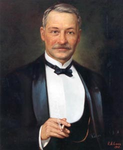This article needs additional citations for verification .(November 2024) |
| |||||||||||||||||||||||||||||||
35 seats in the North-West Legislative Assembly 18 seats were needed for a majority | |||||||||||||||||||||||||||||||
|---|---|---|---|---|---|---|---|---|---|---|---|---|---|---|---|---|---|---|---|---|---|---|---|---|---|---|---|---|---|---|---|
| |||||||||||||||||||||||||||||||
| |||||||||||||||||||||||||||||||
The 1902 North-West Territories general election, occurred on 21 May 1902 and was the fifth general election in the history of the North-West Territories, Canada. It was held to elect 35 Members of the Legislative Assembly of the North-West Territories.
Contents
The Liberal-Conservatives led by incumbent North-West Territories Premier Frederick W. A. G. Haultain, received 8,319 votes, taking 21 of 35 seats. The North-West Territories Liberal Party under the leadership of Donald H. McDonald r received 5,067 votes, and received 7 seats in the Legislative Assembly.
The main issue of the 1902 election was provincial autonomy for the North-West Territories. [1] Political leaders across the North-West Territories had been pushing the federal Laurier Liberal government for provincial status for the Territories since 1896. [2] Support for provincial autonomy was largely unanimous amongst all candidates, and most ran largely on a platform focused on the issue. [3]
Candidates in this election were not nominated by the party in a contested nomination as with modern elections, but rather proclaimed their support for the governing party or opposition party, or Independent. During the election race some candidates shifted their alignment. The result was a confusing mess, and the bulk of candidates proclaimed support for the already governing Liberal-Conservative party, leaving the Liberals without candidates in many districts. Lethbridge ended up being contested by two government supporting candidates.
Three years after the 1902 election, the provinces of Alberta and Saskatchewan were carved out of North-West Territories in 1905, and they took most of the voting population with them. The 1902 election was the last election held in the NWT until 1951, and it elected the last assembly in the Northwest Territories (NWT) to use political parties. After 1905, the NWT government reverted to an appointed consensus model of government. Since 1951, the government of NWT has been of the elected consensus model of government.
1902 would also see the largest number of MLAs elected to the North-West Territories Legislature in the territories' history.
